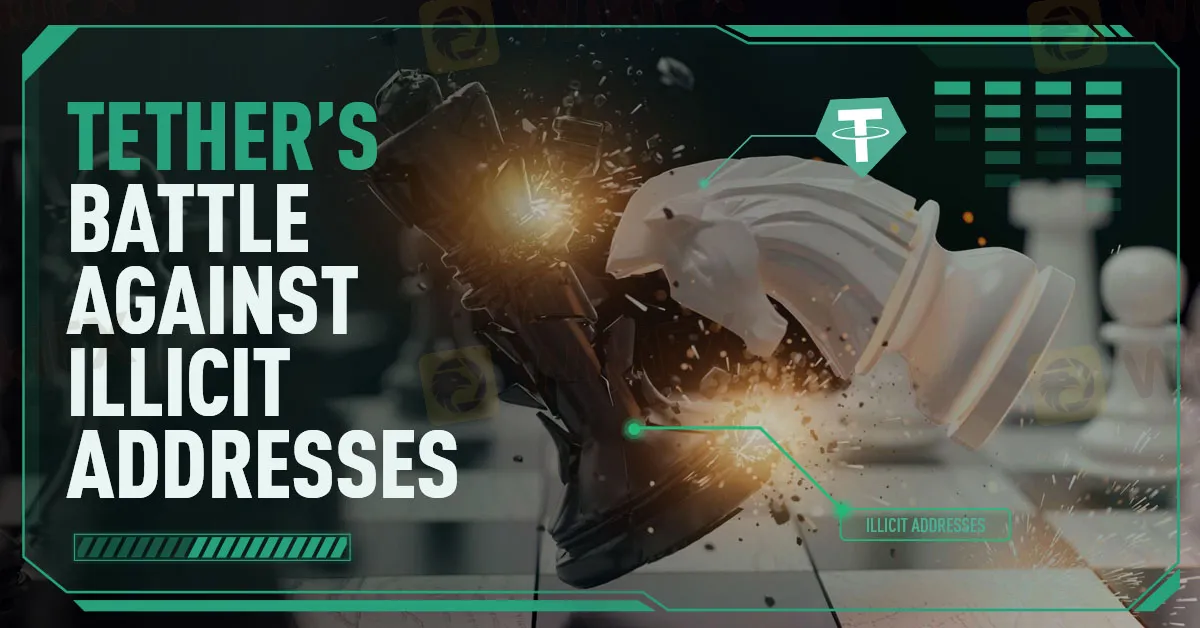简体中文
繁體中文
English
Pусский
日本語
ภาษาไทย
Tiếng Việt
Bahasa Indonesia
Español
हिन्दी
Filippiiniläinen
Français
Deutsch
Português
Türkçe
한국어
العربية
Tether’s Battle Against Illicit Addresses
Abstract:Tether, the primary issuer of the largest stablecoin globally, takes action against more than 30 cryptocurrency addresses, barring their access, after receiving billions in USDT tokens.

Tether, the issuer responsible for the world's largest stablecoin, has recently taken action against over 30 cryptocurrency addresses that collectively received billions in USDT tokens.
This significant manoeuvre, representing a noteworthy operation for Tether, was executed in collaboration with Chainargos, a prominent blockchain intelligence firm.
The specified addresses had received a total of $161 million from Whitebit, a European cryptocurrency exchange rooted in Ukraine. A substantial number of these addresses were involved in handling STUSDT, a token acquired through USDT staking.
Chainargos had earlier identified multiple wallets engaged in “programmatic spamming” activities, involving small-scale transactions of STUSDT, an observation made as far back as August.
Commencing on December 1, Tether initiated the freezing of 28 of these addresses. Subsequently, on December 2, an additional six addresses were blacklisted for moving over $10 million, equating to approximately $1 million in assets. Most of the frozen wallets were linked to STUSDT transactions.

While Tether has refrained from offering specific rationales for these actions, the stablecoin entity has been collaborating with the U.S. Department of Justice (DOJ) in freezing funds associated with illicit activities. Notably, Tether recently voluntarily froze $225 million connected to human trafficking groups in Southeast Asia, marking it as the “largest-ever freeze of USDT.”
Tether's USDT holds the position of the third-largest cryptocurrency by market capitalization and is extensively utilized for trading and value exchange within the cryptocurrency landscape.
In an earlier instance in November, Tether, alongside Bitfinex, its sister crypto exchange, opted to retract their opposition to a Freedom of Information Law (FOIL) request, spurred by journalists such as Zeke Faux from Bloomberg Businessweek.
In an official statement, the stablecoin issuer conveyed that this decision aligns with their commitment to transparency. However, they clarified that not all documents would be disclosed, citing standard business practices.
Tether levied criticism against Zeke Faux's past work, suggesting deviations from traditional journalistic standards. Additionally, the statement highlighted instances of what they referred to as “biased and factually inaccurate reporting” from several media outlets, including the Wall Street Journal and Bloomberg, whose journalists were involved in the FOIL request.
This is not Tether's initial encounter with a FOIL request; they previously attempted to obstruct a request by CoinDesk seeking documents about Tether's reserves amid an inquiry by the New York Attorney General (NYAG) into the full backing of USDT by reserves. Post a legal defeat, Tether has opted not to pursue an appeal and has agreed to engage with journalists and regulators who uphold ethical reporting standards and respect privacy.

Disclaimer:
The views in this article only represent the author's personal views, and do not constitute investment advice on this platform. This platform does not guarantee the accuracy, completeness and timeliness of the information in the article, and will not be liable for any loss caused by the use of or reliance on the information in the article.
Read more

Vanuatu Passes VASP Act to Regulate Crypto and Digital Assets
Vanuatu's new VASP Act regulates crypto businesses, enforcing strict licensing, AML/CFT compliance, and investor protections.

Blockchain Decentralization: Empowering a Trustless Future
In recent years, blockchain technology has rapidly evolved from a niche innovation behind Bitcoin into a transformative force across industries. At its core, blockchain decentralization refers to the distribution of authority and decision-making away from a central entity and into the hands of a distributed network of participants. This shift redefines how data is stored and verified and paves the way for trustless, transparent, and resilient systems that challenge traditional centralized models.

Why the SEC Rejected the First U.S. Bank-Issued Stablecoin
The SEC rejected the first U.S. bank-issued stablecoin, citing regulatory concerns. This decision highlights the ongoing challenges in crypto asset classification and oversight.

UK Authorities Freeze Nearly $7.7 Million in Illicit Crypto Assets Within a Year
Crypto wallets tied to fraud and tax evasion were frozen under new enforcement powers granted in 2024.
WikiFX Broker
Latest News
Exposing the Top 5 Scam Brokers of March 2025: A Closer Look by WikiFX
Gold Prices Climb Again – Have Investors Seized the Opportunity?
Webull Launches SMSF Investment Platform with Zero Fees
Australian Regulator Warns of Money Laundering and Fraud Risks in Crypto ATMs
The Withdrawal Trap: How Scam Brokers Lure Victims into Paying More
FCA to Investors: Think Twice Before Trusting These Brokers
Trump\s tariffs: How could they affect the UK and your money
HTFX Spreads Joy During Eid Charity Event in Jakarta
How Will the Market React at a Crucial Turning Point?
Australian Authorities Joins Forces with Philippine Authorities to Combat Cyber Scams
Currency Calculator







